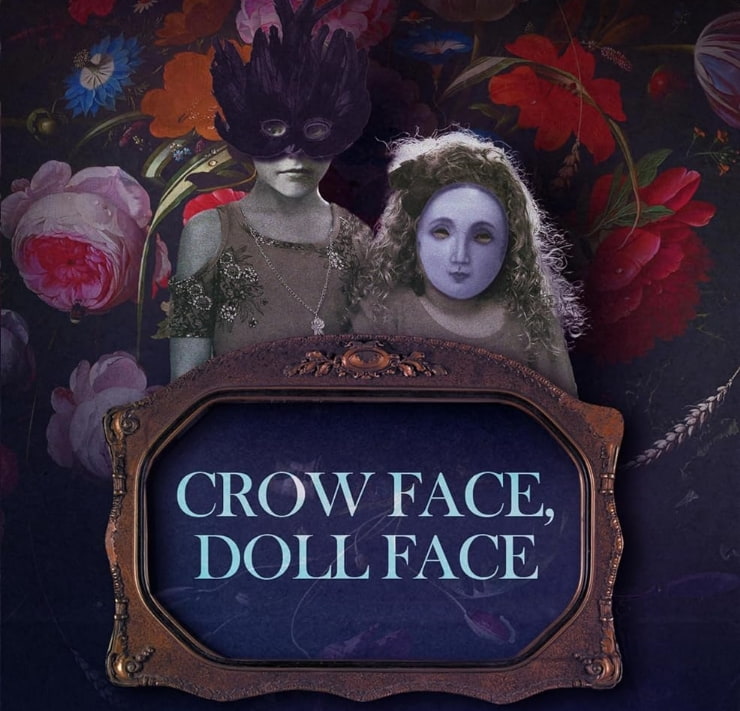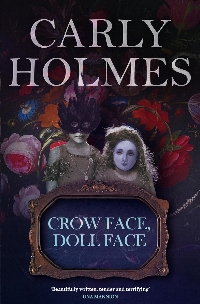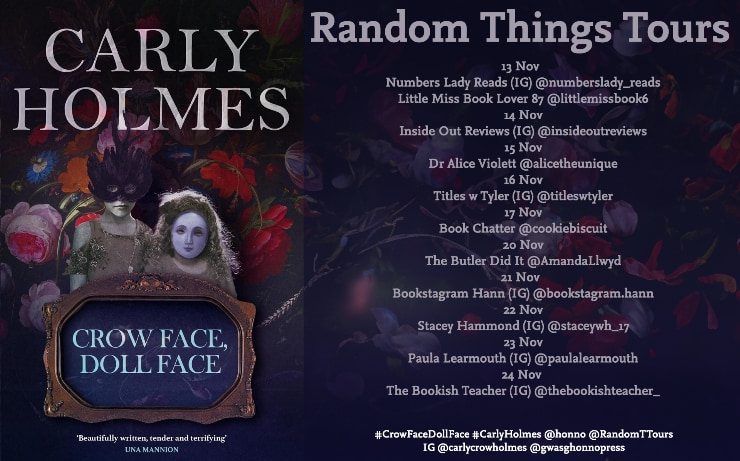Blog tour: Crow Face, Doll Face by Carly Holmes

This post is part of a blog tour organised by Random Things Blog Tours. I received a free copy of the book in return for an honest review.
‘Unhappily married mother of four Annie is drowning in domestic servitude.
‘She often wonders what her life could have been had she not had children, but when her youngest daughters perform a seemingly impossible act of levitation, her life is touched with magic and she realises that her girls are truly special and that she must protect them.
‘Eventually Annie musters the courage to leave the wreck of her marriage, but she commits a terrible, unthinkable, unmotherly act along the way.
‘Crow Face, Doll Face explores being forced to live with the consequences of the decisions we make and the fantasies we construct to soothe ourselves when the life we live falls far short of the life we planned.’

In Crow Face, Doll Face, by Carly Holmes, we follow 40-year-old Annie as her marriage and mind unravel.
After her husband, Peter, leaves her for another woman, Annie runs far away to live in a rented cottage with the youngest two of her four children – Kitty, nicknamed “Doll Face”, and Leila, nicknamed “Crow Face”.
Annie’s oldest child, Julian, is already living with Peter and his glamorous-seeming new girlfriend, Bet. But what becomes of Elsa, Annie’s ill-favoured second child? And are Kitty and Leila truly extraordinary, as Annie has come to believe?
I absolutely loved Crow Face, Doll Face. The author’s meticulous observations of family life, and the sinister and spooky undercurrents that lace the book, had me enthralled.
I was on tenterhooks throughout due to the constant sense that something terrible was about to happen, as Annie’s thoughts became increasingly irrational, and her immature daughters were able to take more and more control of her.
I was especially fascinated by the relationships Annie and Peter had with each of their children, as well as those between the children themselves.
When I was reading up on experiences of siblinghood for my thesis, I was particularly captivated by the idea that children from the same household can’t be described as having grown up in the same environment, for a number of reasons including parental favouritism. I was also very interested in the ways that having siblings doesn’t guarantee companionship. Both of these ideas play out to devastating effect in this novel.
As the oldest, the only boy, and having been an easy baby, Julian is especially favoured by Annie, so it hits her hard that he’d rather live with Peter and Bet than with her.
By contrast, Annie had (undiagnosed) post-natal depression (PND) with Elsa, forever affecting their relationship. Elsa is also less charismastic and more needy than her brother and sisters.
To make things worse for Elsa, Kitty is a beautiful child (hence the nickname “Doll Face”) and very obviously Julian’s favourite, and so strongly bonded with the striking Leila (hence “Crow Face”) that Annie treats them as a unit.
This has implications for the older children. At first, Julian and Elsa gang up against their two younger siblings. When Julian grows away from Elsa, then exits the household altogether, though, Elsa is left feeling even more unwanted and isolated.
The cruelties the siblings deal out to one another, as well as their mother, contribute considerably to the book’s unsettling tone, and ring true. I got major Shirley Jackson vibes, which is a very good thing!
Holmes’ vivid portrayal of the trials and tribulations of parenthood and the plain weirdness of small children put me in mind of Jackson’s humorous memoirs of family life, Life Among the Savages and Raising Demons.
Holmes’ no-holds-barred descriptions of the children’s casual awfulness to one another, meanwhile, have affinity with The Road Through the Wall, which I read after Crow Face, Doll Face to prolong the atmosphere.
Another element typical of Jackson, that Holmes deploys to great effect, is claustrophobia. She doesn’t make it explicit when Crow Face, Doll Face is set, but I put it in the ’70s or ’80s. The absence of cultural references adds to the impression that Annie is very cut-off, and gives the story a timeless feel.
Annie’s isolation is intensified by the fact she doesn’t have a landline, so she has to rely on neighbours and phoneboxes to maintain her dwindling wider connections.
Furthermore, having PND at a time when the condition is poorly understood and highly stigmatised, Annie has no way of knowing she’s not alone in her experience. Her sense of shame for having been a “bad mother” during this period underlies many of her subsequent thoughts and actions.
Crow Face, Doll Face is brilliantly vivid, compelling, and unsettling.
